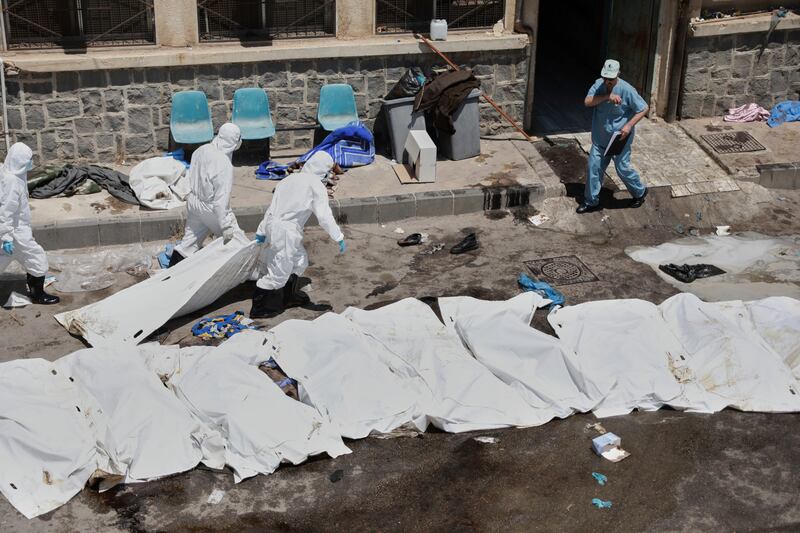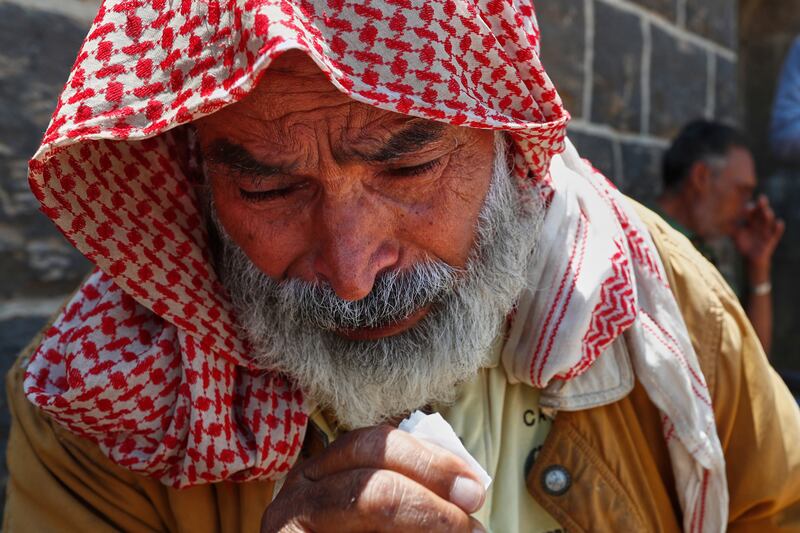- Ceasefire agreement reached in southern Syria city of Suwayda after violent clashes.
- Tom Barrack, U.S. special envoy to Syria, criticizes Israel's intervention in Syria, resulting in regional instability.
- The conflict was primarily between the Druze and Bedouin communities in the area.
After a week of violence where hundreds of Druze civilians and hundreds more Druze, Syrian and Bedouin fighters were reportedly killed, the Syrian government reported that clashes in the southern city of Suwayda have stopped.
On Saturday, the government, Druze groups and Bedouin tribes reached a ceasefire agreement that seemed to be holding, per CNN. Communications with the province remain difficult.
On Sunday, there were no reports of gunfire in the city of Suwayda, per reports.
“After several bloody days in Suwayda province, the Internal Security Forces have succeeded in calming the situation following their deployment in the northern and western areas,” Syria’s Interior Minister Anas Khattab said in a post on X, per CNN.
“They managed to enforce the ceasefire within the city of Suwayda, paving the way for a prisoner exchange phase and the gradual restoration of stability across the province,” he continued.
According to CNN, this prisoner exchange has not yet happened.
The U.S. condemns the violence and criticizes intervention by Israel

Tom Barrack, U.S. ambassador to Turkey and special envoy for Syria, posted on X on Sunday acknowledging the ceasefire, saying that “The next foundation stone on a path to inclusion, and lasting de-escalation, is a complete exchange of hostages and detainees, the logistics of which are in process.”
According to The Associated Press, Barrack criticized Israel’s intervention in the violence in Syria, “calling it poorly timed and saying it complicated efforts to stabilize the region.”
Barrack also doubled down on the United States’ support for the new Syrian government.
He added that the U.S. was not consulted in the decision for Israel to strike Syria last week, “nor was it the United States’ responsibility in matters that Israel feels is for its own self-defense,” per The Hill.
President Donald Trump has so far put his support behind the interim Syrian government, which ousted dictator Bashar Assad and took power late last year, per The Hill.
In May, Trump announced he would be giving Syria a chance to rebuild by lifting all U.S. sanctions on the country.
U.S. Secretary of State Marco Rubio also spoke about the conflict in Syria. On Saturday he called on the Syrian government to use its forces to stop“violent jihadists” from entering Suwayda and “carrying out massacres,” per CNN.
What happened that led to the ceasefire?
Last week fighting broke out between the Druze and Bedouin communities in southern Syria, and over 300 people were reportedly killed in the fighting, per The Hill.
In response, Israel launched airstrikes against both Damascus and Syrian government forces “over what it said was protection for the Druze community,” per The Hill.
In Israel, the Druze minority is deeply respected and integrated.
Israeli Prime Minister Benjamin Netanyahu said that the strikes against Syria were meant to prevent the militarization of Syrian forces on Israel’s northern border as well as protect “the brothers of our brothers, the Druze at the Druze Mountain,” per The Hill.
The Israeli strikes were condemned by interim Syrian president Ahmad Al-Sharaa who said they were an attempt to cause “chaos” in the country.
According to the AP, the Syrian government also intervened in the violence and fought alongside the Bedouins before withdrawing due to the ceasefire agreement.
Humanitarian aid was sent into the area following the ceasefire agreement.
In a broadcast on Saturday, Interim President Ahmad al-Sharaa, urged the Bedouins to leave the city saying that they “cannot replace the role of the state in handling the country’s affairs and restoring security,” per ABC.
“We thank the Bedouins for their heroic stances but demand they fully commit to the ceasefire and comply with the state’s orders,” he added.
Who are the Druze?
The Druze are a Middle Eastern ethnic group that live in several different countries after they were separated by borders drawn by the breakup of the Ottoman empire in the early 1920s.
But unlike other ethnic groups like the Kurds, who are largely Muslim, “the Druze are a unique religious and ethnic group. Their tradition dates back to the 11th century and incorporates elements of Islam, Hinduism and even classical Greek philosophy,” per Pew Research Center.
There are over 1 million members of the community who live primarily in Syria and Lebanon with smaller communities in Israel and Jordan.
The Religion Media Centre reported that “The Druze follow an esoteric, monotheistic religion that blends elements of other Abrahamic religions, including Judaism and Christianity, as well as several other philosophies such as Hinduism.”
The Druze are known for being a close-knit community active in public life. Many Israeli Druze have served in the Israeli military.
Around 700,000 Druze live in Syria, mostly in the southern province of al-Suweida, and historically they’ve generally maintained a degree of autonomy, per The Religion Media Centre.
According to CNN, the Bedouins are a semi-nomadic group that is predominantly tribal. They have family trees that extend into Gaza and Egypt’s northern Sinai.


